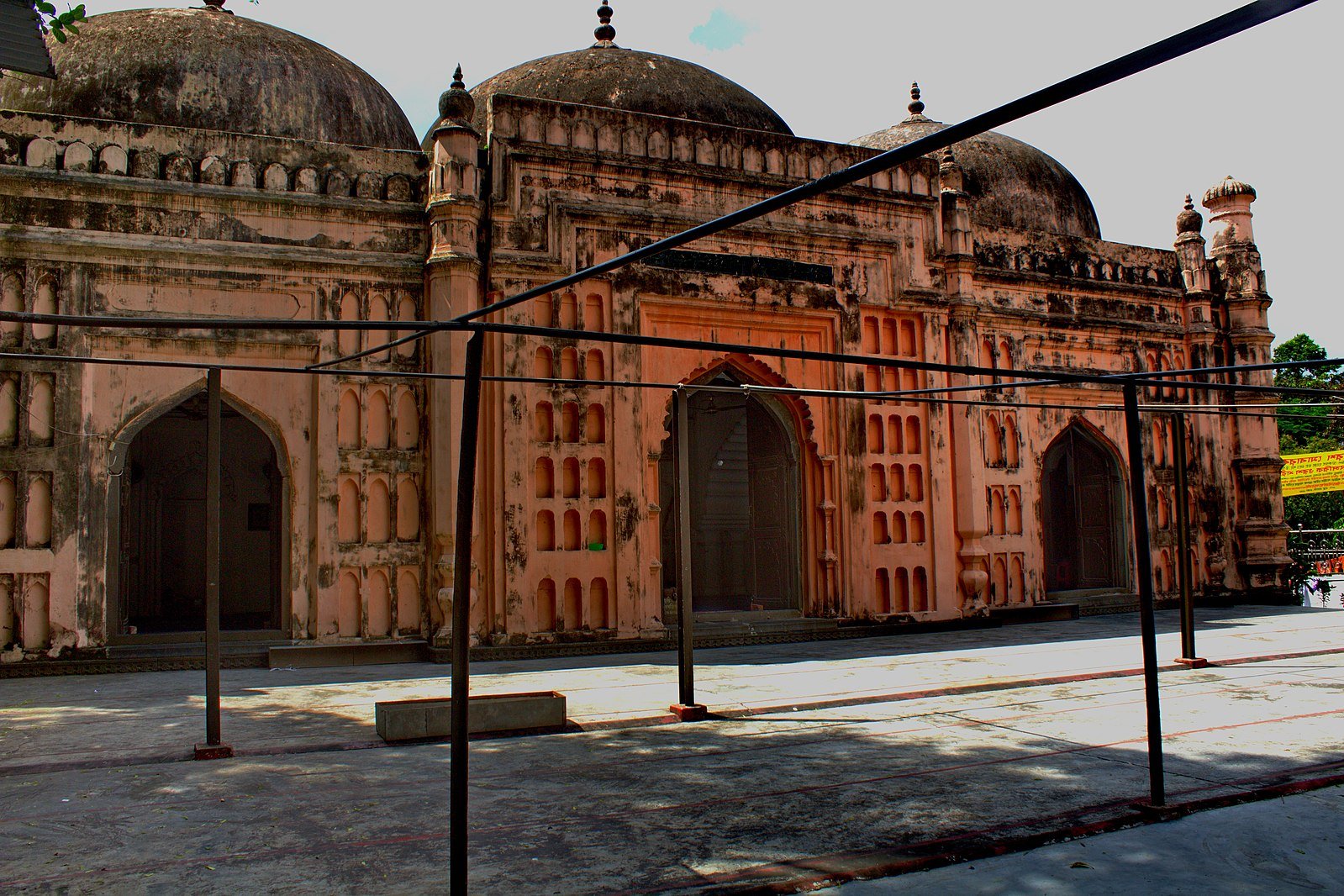Freedom of Press in Bangladesh: Fact vs. Fear
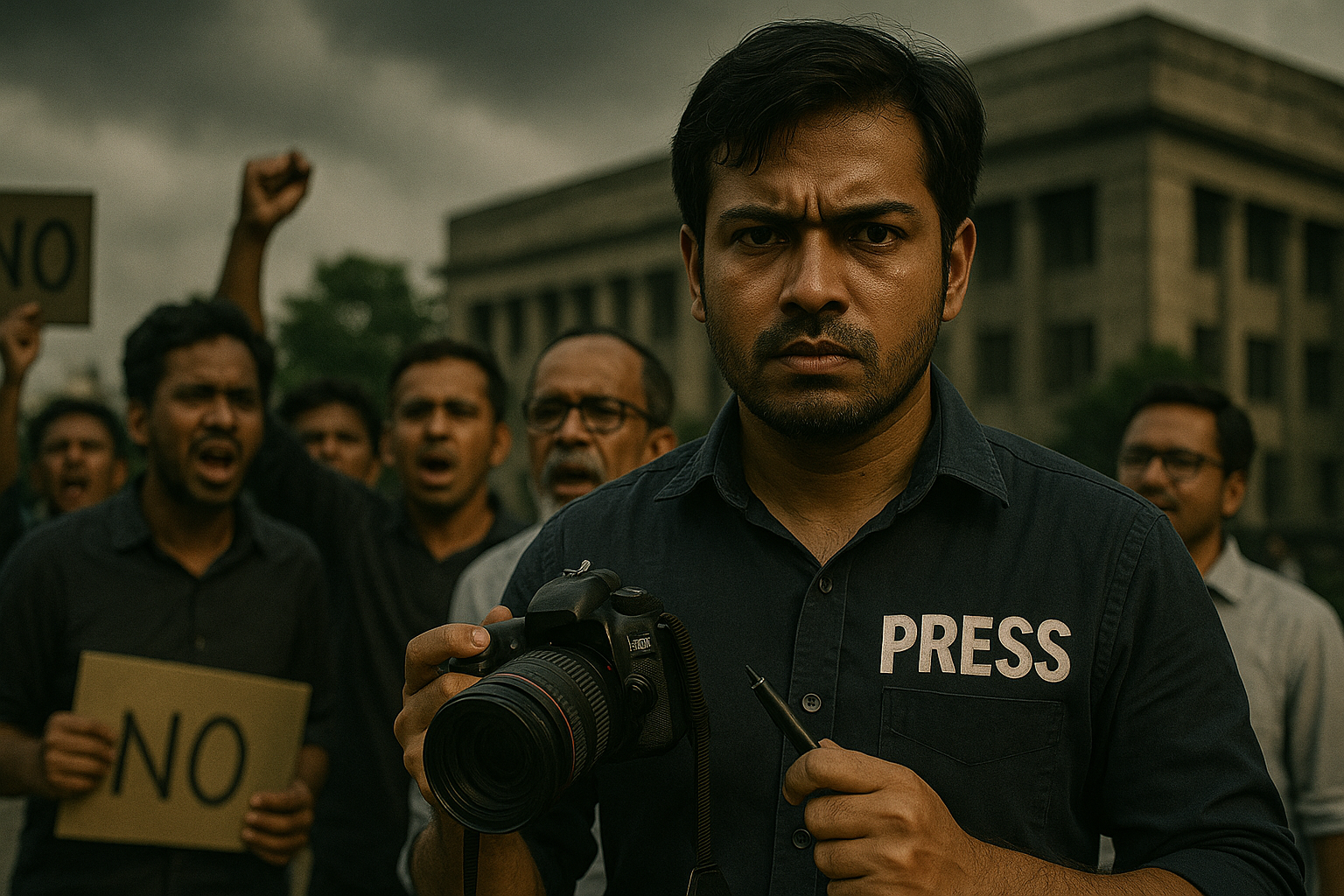
Press Freedom in Bangladesh: Between Constitutional Rights and a Culture of Control
Freedom of the press is a cornerstone of democratic societies, ensuring transparency, accountability, and the free flow of information. In Bangladesh, however, this fundamental right has been under persistent threat, oscillating between fleeting hopes and enduring fears. Despite constitutional guarantees, journalists and media outlets face a myriad of challenges that hinder their ability to operate freely and safely. This article delves into the current state of press freedom in Bangladesh, examining the facts, fears, and the path forward.
1. Constitutional Guarantees vs. Ground Realities
The Constitution of Bangladesh provides a clear legal foundation for press freedom. Under Article 39 of the Constitution, every citizen is granted the right to freedom of thought, conscience, speech, and expression—including freedom of the press:
“Freedom of thought and conscience is guaranteed. Subject to any reasonable restrictions… every citizen shall have the right to freedom of speech and expression, and freedom of the press.”
— Constitution of the People’s Republic of Bangladesh, Article 39(1 & 2)
Despite this constitutional safeguard, the ground reality often diverges sharply. Successive governments have introduced laws that, rather than protecting press freedom, curtail it through broad and ambiguous language.
One of the most notable examples is the Digital Security Act (DSA) 2018. Originally introduced as a cybersecurity measure, the DSA quickly became a tool to suppress dissent. Sections 25, 28, and 31 were commonly used to detain journalists, activists, and social media users for publishing content labeled as “false,” “offensive,” or “anti-state.”
According to Human Rights Watch, more than 2,000 cases were filed under the DSA by 2022, many targeting individuals who criticized government policies or public figures online.
Under mounting public and international pressure, the government repealed the DSA in 2023 and replaced it with the Cyber Security Act (CSA) 2023. However, rights groups argue that the CSA retains much of the same vague and punitive language, allowing authorities to arrest individuals without a warrant for online content deemed “harmful to public order.”
In 2024, Amnesty International warned that the CSA continues to be used to stifle dissent and silence critics under the guise of national security and public order.
What’s particularly alarming is the selective enforcement of these laws. Media outlets aligned with the government often avoid scrutiny, while independent journalists and critics face legal harassment, threats, or even physical attacks. This unequal treatment fosters a culture of fear and self-censorship, weakening journalism’s role as a democratic watchdog.
These legal and institutional pressures are reflected in global rankings. In the 2024 World Press Freedom Index published by Reporters Without Borders, Bangladesh ranked 165th out of 180 countries, its lowest position ever. The index cited “institutional harassment,” “arbitrary detentions,” and “lack of media pluralism” as significant barriers to press freedom in the country.
2. The Digital Security Act and Its Successor
Among the most controversial laws affecting press freedom in Bangladesh, the Digital Security Act (DSA) of 2018 stood out as a major flashpoint. Initially framed as legislation to combat cybercrime and protect digital infrastructure, the DSA soon became a tool for silencing dissent and criminalizing journalism.
The law granted sweeping powers to authorities and included vague provisions that blurred the line between legitimate criticism and criminal offense. Notably:
- Section 25 penalized the publication of “false or offensive information.”
- Section 28 criminalized content deemed hurtful to religious sentiments.
- Section 31 targeted content that could “create unrest or deteriorate law and order.”
These provisions enabled law enforcement to detain journalists, students, cartoonists, and even Facebook users for online expression. Criticism of government actions or political figures was often interpreted as “anti-state” behavior.
According to UN Human Rights Chief Volker Türk, more than 2,000 cases were filed under the DSA between 2018 and early 2023. Many of those targeted were journalists and human rights defenders who had criticized the government’s actions online.
A turning point came with the tragic death of Mushtaq Ahmed, a writer and activist arrested in 2020 for his social media posts about the government’s handling of COVID-19. After being denied bail six times, he died in custody in February 2021, sparking widespread protests and international condemnation from groups such as Human Rights Watch and Amnesty International.
Facing both domestic and international backlash, the Bangladeshi government announced in August 2023 that the DSA would be repealed and replaced with a new law—the Cyber Security Act (CSA) 2023.
However, the CSA quickly drew criticism for being a rebranded version of the same repressive framework. Legal experts and civil rights groups noted that the law retained many of the DSA’s most problematic features:
- Continued allowance of arrest without warrant
- Criminalization of defamation in digital spaces
- Maintenance of non-bailable offenses
In a September 2023 statement, Amnesty International warned that the CSA “fails to meet international human rights standards” and was already being used during student-led protests to arrest or intimidate young activists speaking out online.
Supporting this view, ARTICLE 19 South Asia emphasized that the new law did not address fundamental flaws such as the over-criminalization of speech and the absence of judicial oversight.
While the name has changed, the essence of the law remains repressive. For journalists and citizens alike, the CSA continues to create a chilling effect on digital expression, raising serious concerns about freedom of speech in Bangladesh and the safety of those who challenge authority.
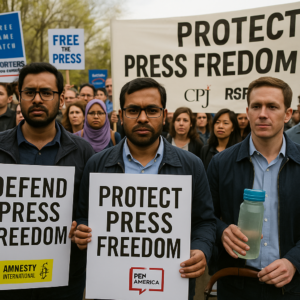
3. Press Freedom Rankings: A Declining Trend
Bangladesh’s global press freedom ranking is in free fall, reflecting a growing crisis for journalists and independent media. In the 2024 World Press Freedom Index by Reporters Without Borders (RSF), Bangladesh ranked 165th out of 180 countries—its worst position ever.
This alarming drop places Bangladesh among the lowest-ranked Asian nations, ahead of only authoritarian states like China and North Korea. The reason? A hostile environment where legal threats, political pressure, and physical violence silence critical voices.
Why Bangladesh’s Ranking Fell
According to RSF, the following factors contributed to the decline:
- State surveillance and politically motivated lawsuits against journalists
- Violent attacks by law enforcement or ruling party supporters
- Censorship through harsh laws, like the former Digital Security Act and its successor, the Cyber Security Act
- Growing self-censorship, especially in TV channels and major newspapers
- Many media outlets—particularly those reliant on government ads—avoid sensitive topics like corruption, police abuse, or opposition politics. This has forced journalists to choose between their job and personal safety.
A Worrying Trend Over Time
This wasn’t a sudden drop. Bangladesh’s rankings have worsened year after year:
- 2018: 146th
- 2021: 152nd
- 2023: 163rd
- 2024: 165th
Global Outrage Over Journalist Harassment
The press freedom crisis has sparked international concern. In 2023, the UN Human Rights Office condemned the detention and intimidation of journalists in Bangladesh, urging the government to revise its laws and respect freedom of expression.
Similarly, the Committee to Protect Journalists (CPJ) reported multiple attacks during political protests in Dhaka and Chattogram, where reporters were beaten or had their gear seized—often in front of police, who did nothing.
Chilling Effect on Journalism
This climate doesn’t just affect mainstream media. Citizen journalists, bloggers, and activists are also staying silent or quitting altogether. The fear of surveillance, arrest, or assault has made press freedom in Bangladesh a fading ideal.
4. Harassment and Violence Against Journalists
Journalists in Bangladesh are increasingly facing threats to their safety and freedom, extending beyond censorship and restrictive laws. From rural reporters exposing local corruption to national correspondents investigating abuse of power, media professionals operate in an environment marked by fear, hostility, and impunity.
Alarming Statistics on Journalist Harassment
In the first six months of 2024, Ain o Salish Kendra (ASK), a leading human rights organization in Bangladesh, reported that at least 145 journalists were subjected to torture, harassment, lawsuits, and threats. These incidents included physical assaults, arrests, and obstruction while performing their duties. One notable case involved journalist Shafiuzzaman Rana, who was sentenced to six months in jail by a mobile court after seeking information on government procurement activities.
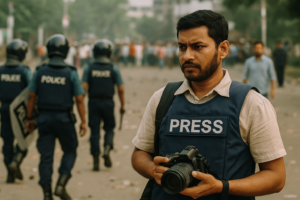
Violence During Political Events
Political events have become increasingly dangerous for journalists. On October 28, 2023, during opposition protests in Dhaka, at least 27 journalists were attacked by supporters of both the ruling Awami League and the opposition Bangladesh Nationalist Party, as well as by police forces. These attacks included beatings, equipment seizures, and the firing of rubber bullets and tear gas at clearly identified media personnel.
Digital Harassment and Gender-Based Threats
Digital harassment is a growing concern, particularly for female journalists. Investigative reporter Rozina Islam, who was arrested in 2021 under the Official Secrets Act, has faced ongoing legal challenges and online abuse. She has reported receiving anonymous death threats and gender-based harassment following her critical reporting on public institutions.
5. The Impact of Political Turmoil
In Bangladesh, political upheavals have consistently shaped the contours of press freedom—for better or worse. The dramatic ouster of former Prime Minister Sheikh Hasina in August 2024, after years of criticism over her administration’s authoritarian tilt, initially sparked hope among journalists and civil society. Many believed that her removal, triggered by mass protests and mounting international pressure, might usher in a new era of transparency and media independence.
However, that optimism was short-lived. The interim government, led by Nobel Peace Prize laureate Muhammad Yunus, quickly came under scrutiny for perpetuating many of the same repressive media practices it had promised to dismantle. One of the most controversial moves came in November 2024, when the government abruptly revoked the press credentials of 167 journalists without offering any public explanation. The decision sparked immediate outrage from both domestic press unions and international watchdogs.
According to a report by The Guardian, several of the affected journalists had been critical of the transitional government’s economic and security policies. AP News further revealed that the revocations disproportionately targeted reporters covering government corruption, student protests, and cross-border tensions—raising fears that the move was politically motivated rather than grounded in journalistic ethics or national security.
Rights organizations like CIVICUS Monitor and The Borderlens condemned the action as an assault on press freedom, noting that many of the affected journalists were working with independent or opposition-affiliated outlets. CIVICUS labeled the act a “calculated attempt to mute dissent during a fragile democratic transition”.
This episode underscored a disturbing continuity: changing political leadership does not necessarily translate into greater media freedom. Even under a government branded as reformist, the culture of control and surveillance persists—often repackaged in the language of national interest or bureaucratic procedure.
The political climate remains tense. Journalists now find themselves navigating new power dynamics, with uncertainty over how far the interim administration is willing to tolerate criticism. For many, the fear that once accompanied authoritarian rule has simply been replaced with anxiety over unpredictability.
In this context, press freedom in Bangladesh appears less a product of political ideology and more a casualty of systemic power struggles. Without structural reforms and a commitment to protecting journalistic rights beyond regime changes, media independence remains perpetually at risk.
6. Self-Censorship: A Growing Concern
Political upheaval in Bangladesh has long influenced the state of press freedom. A dramatic shift in August 2024, when Sheikh Hasina was ousted, initially sparked hope for a new era of media independence. Critics had long accused Hasina of authoritarian practices, and her removal, following mass protests and international pressure, seemed like a chance for transparency and press freedom.
However, that optimism quickly dissipated. The interim government, led by Nobel Peace Prize laureate Muhammad Yunus, soon came under fire for maintaining the same repressive policies it had promised to undo. One of the most contentious actions occurred in November 2024, when the government revoked the press credentials of 167 journalists without explanation.
Controversial Moves and International Outcry
The decision triggered outrage from both local press unions and global watchdogs. According to The Guardian, many of the journalists targeted had criticized the interim government’s policies on economy and national security. AP News further reported that those affected were often covering sensitive topics like government corruption, student protests, and cross-border issues—fueling suspicions of politically motivated censorship.
Rights groups such as CIVICUS Monitor and The Borderlens condemned the government’s actions, with CIVICUS calling it a “calculated attempt to mute dissent” during a fragile political transition.
The Status Quo: A Perpetual Struggle for Press Freedom
This episode highlighted a troubling pattern: changing political regimes do not necessarily bring media freedom. Even a reform-minded government can perpetuate the culture of control that suppresses independent journalism, often masking it under the guise of national interest or bureaucratic procedures.
As Bangladesh’s political climate remains volatile, journalists are caught in a complicated web of uncertainty. Many now face a new form of fear—anxiety over what the interim administration will tolerate. The threat of censorship may have evolved, but the fundamental struggle for press freedom continues.
In conclusion, press freedom in Bangladesh appears less a product of political ideology and more the result of a long-standing power struggle. Without significant reforms, journalists will remain at the mercy of political uncertainty, and media independence will remain an elusive goal.
7. International Reactions and Calls for Reform
As press freedom in Bangladesh continues to decline, international attention has intensified. Rights organizations, media watchdogs, and global observers have raised alarms, urging the Bangladeshi government to protect journalists, repeal restrictive laws, and create an environment that fosters free expression.
The Shift from DSA to CSA: A Rebranding Criticism
The Digital Security Act (DSA), which had been heavily criticized for stifling dissent, was repealed in 2023. While some hailed this as a step toward progress, the introduction of the Cyber Security Act (CSA) soon after raised concerns. Critics argue that the CSA retains many of the same vague and punitive clauses, effectively continuing the repression of media freedom.
Amnesty International strongly condemned the CSA, warning that it would perpetuate harassment and arbitrary detentions of journalists and critics. In a statement issued in late 2024, Amnesty urged the interim government to repeal the CSA and reinstate genuine freedom of expression.
Reporters Without Borders and Other Global Outcry
The 2024 World Press Freedom Index from Reporters Without Borders (RSF) placed Bangladesh at a concerning 165th out of 180 countries, its lowest ranking ever. RSF called on Bangladeshi authorities to implement “concrete measures” to protect journalists, end censorship, and ensure press independence. RSF emphasized that continued media suppression would tarnish Bangladesh’s democratic processes and its global reputation.
International Legal Criticism
The JURIST News, hosted by the University of Pittsburgh, criticized the CSA for violating Bangladesh’s constitutional guarantees and its international commitments under the International Covenant on Civil and Political Rights (ICCPR). JURIST stated that laws limiting freedom of expression must adhere to strict standards, something the CSA allegedly fails to do.

Continued International Coverage and Calls for Reform
International media outlets like AP News and The Guardian have been vocal in their coverage of press freedom violations in Bangladesh. Both highlighted arbitrary arrests, the revocation of press credentials, and growing threats to journalists. The revocation of credentials for 167 journalists in November 2024 sparked global condemnation and was seen as a significant step back for media freedom.
The Need for Domestic Reform
Despite mounting international pressure, Bangladeshi authorities have largely remained unresponsive. Critics argue that international condemnation alone is insufficient. Effective reform requires political will, an independent judiciary, and civil society participation.
However, the continued international spotlight in Bangladesh keeps the issue at the forefront of global discussions. Advocacy by foreign governments, multilateral institutions, and civil rights organizations remains crucial in pushing for policy changes that could restore press freedom in Bangladesh.
8. The Role of Civil Society and Media Organizations
In Bangladesh, despite state-driven restrictions, civil society and independent media organizations have emerged as resilient defenders of press freedom. Faced with increasing censorship, harassment, and intimidation, these groups continue to advocate for journalistic reform, transparency, and the protection of journalists’ rights, often at significant personal and institutional risk.
Editors’ Council: Leading the Charge
One of the most vocal defenders has been the Editors’ Council (Shampadak Parishad), a collective of prominent editors from national newspapers. In response to the revocation of press credentials for 167 journalists in November 2024, the council issued a strong condemnation. They argued that such actions foster “a climate of fear and self-censorship” and undermine the constitutional right to freedom of expression. They called for the immediate restoration of credentials and an end to punitive actions without due process.
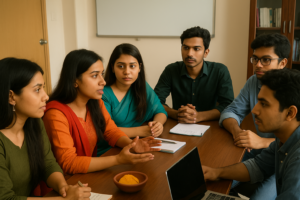
Research and Advocacy by the Centre for Governance Studies
The Centre for Governance Studies (CGS), a Dhaka-based think tank, has been instrumental in documenting the state of press freedom. In a 2024 policy paper, CGS highlighted how legal tools like the Digital Security Act (DSA) and the Cyber Security Act (CSA) have created an oppressive environment for journalists. The report urged reform of these laws to align with Bangladesh’s constitutional and international obligations (CGS, 2024).
Empowering Local Journalists: BNNRC and BCDJC
Media advocacy groups such as the Bangladesh NGOs Network for Radio and Communication (BNNRC) and the Bangladesh Centre for Development, Journalism, and Communication (BCDJC) work at the grassroots level to empower rural journalists. These organizations offer training, legal aid, and awareness campaigns to help strengthen the role of media in promoting democratic values.
Taking Concerns to the Global Stage
Civil society groups have also brought their concerns to international forums. Joint statements from Bangladeshi rights organizations and global watchdogs have been submitted to UN Human Rights Council reviews, calling on the government to end arbitrary actions against journalists and establish independent media oversight mechanisms.
Independent Journalists: The Last Line of Defense
Despite mounting pressures, independent journalists and small media outlets, especially online platforms, continue to investigate and report on critical issues. These voices often serve as the last line of defense against state-controlled narratives, operating in a hostile environment where press freedom is increasingly restricted.
A Hopeful Future for Media Freedom
Although these efforts have yet to result in sweeping reforms, the ongoing resistance from civil society and media organizations offers hope. Their work keeps the conversation on press freedom alive, protects targeted journalists, and lays the foundation for a freer and more accountable media landscape in Bangladesh.
9. The Path Forward: Recommendations
To improve press freedom in Bangladesh, several steps are necessary:
- Legal Reforms: Repeal or amend laws like the CSA that are used to suppress dissent.Amnesty International
- Protect Journalists: Implement measures to safeguard journalists from harassment and violence.
- Ensure Accountability: Investigate and prosecute those responsible for attacks on journalists.
- Promote Media Independence: Encourage diverse and independent media outlets free from political influence.
- Foster Open Dialogue: Engage with civil society and international organizations to develop strategies that support press freedom.
Toward a Freer Press
The state of press freedom in Bangladesh is a complex interplay of constitutional promises and on-the-ground realities marked by fear and repression. While recent political changes offered a glimmer of hope, sustained efforts are required to transform this hope into tangible improvements. Ensuring a free and independent press is not only vital for democracy but also for the protection of human rights and the promotion of transparency and accountability in governance.



